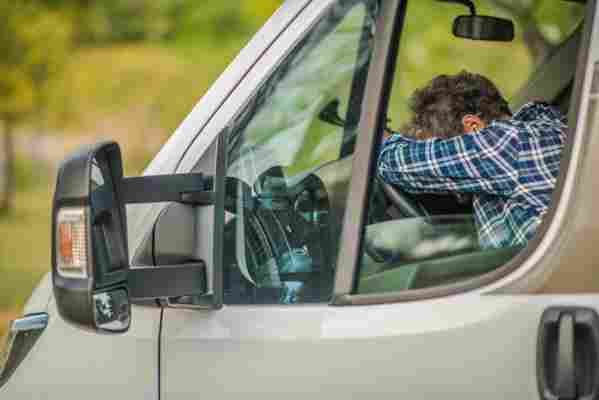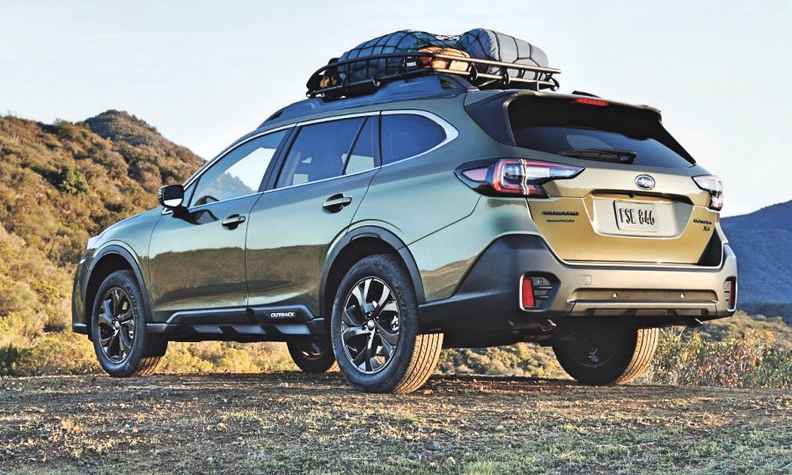Tips for taking a week-long RV trip
Let me start by saying that my family and I camp all the time. And typically when we do, it’s either pitching a tent or sleeping in the back of my van. But with a week off from school and three kids under the age of eight, my wife and I decided that if we were going to do another trip, we needed to find something a little bigger and a bit more comfortable…
Deciding to take an RV on our trip was the easy part. Figuring out where to go, what to pack and how to plan was much more challenging. But if I can do it, anyone can. So, if you’ve got some time off and you’re ready for a fun family vacation, check out some of my tips for having a safe and successful week-long RV trip.
Find your perfect RV.
Once you’ve decided you want to take an RV on your trip, you need to figure out which unit is the right fit. Asking yourself some key questions can help narrow down the search: How many people are going? Do I have a car that can tow a trailer? Do I want to bring a car and the RV? For me, I knew we needed something that could comfortably sleep five and offer enough storage space for all the kid’s gear. I also wanted something that my wife felt comfortable driving if she needed to. We decided to go with a 2020 Entegra Coach Odyssey Class C. The Class C motorhome was a super easy transition from my van and offered plenty of space for the whole family, while still allowing us to feel close. And even though we didn’t bring our car, the Class C could’ve easily towed one should we have decided to bring it.
10 Stress Free RV Travel Tips
This post may contain affiliate links or mention our own products, please check out our disclosure policy .

In 2007 Rene Agredano embarked on full-time RVing and never looked back. Through her work as a writer and creator, she loves sharing this adventurous lifestyle with other nomads here at Let’s RV, and on her website at
Taking an RV trip is supposed to be a fun event. But a stress free RV travel day takes practice. The first few RV moving days that you take that big house on wheels out on the road is exciting and stressful. From what to pack for RV camping, to your RV trip planning, there’s so much to remember before departure day.
Your Stress Free RV Travel Day Starts with Check Lists
Give yourself time to learn how to enjoy stress free RV travel.
Follow a good RV travel day check list to take some driving day stress away. Whether you have a travel trailer camper or a motorhome, camper van or truck camper, RV travel lists help you stay organized and prevent distraction (the #1 cause of beginner RV owner mistakes). They can help you start packing weeks ahead of your trip, and stay organized the day you leave town.
On departure day, my RV trip planning list can give you ideas to create your own.
Checklist for the Night Before Departure Day
Empty holding tanks if full Fill freshwater tank if going boondocking Put tension bars in refrigerator and cabinets Stow loose objects on counters and walls Store campsite chairs, RV patio mat, etc. Pack food and turn on refrigerator if parked Stash personal items, clothing, and pet gear Charge electronic devices Check RV tire PSI
Checklist for RV Departure Day
Disconnect utilities Turn off refrigerator and water heater Bring in slide and awning Lock windows Secure cabinets Make coffee and morning snack Put electronics and dog in truck Retract landing jacks and stabilizers Start fifth wheel hitch up process
Minimize RV Travel Day Stress for Kids and Dogs, Too
My dog always knows when we get ready to go camping. Kids probably do too. I don’t have any, so I can’t comment on nervous RVing kids. But when it comes to our dog, he senses our excitement, and our stress. Our nervous energy that happens when getting ready to leave is reflected right back to us with his own nervous pacing and whining. The behavior adds stress to our day, and his too.
The good news is that after so many years traveling together, we’ve found some tricks to minimize RV travel day stress for dogs like him.
Stress Free RV Travel Tips for Nervous Dogs
Create a safe space for your pet in your tow vehicle, or somewhere near you in a motorhome. Ideally your RVing dog will be crated during travel. Start the departure day process the night before. Do as many tasks as possible to minimize your dog’s anxiety. Remain calm and relaxed on departure day. Act as if leaving is no big deal and eventually your dog will behave that way too.
After a few trips, your pets will probably start to understand that RVing is fun. If your cat or dog is still nervous, talk to your vet about pet calming tools to help them feel more comfortable. We found the Calming Cap for dogs helped our dog. It looks goofy, but the device did wonders for our Shepherd’s mental health (and ours!).
Make Your RV Driving Day Easy
One of the best lessons we learned as RV newbies is to make driving day easy. Remember that whether you are navigator or driver, RV travel days are harder on the mind and body than a typical passenger car road trip. Give yourself plenty of time and space to have a safe adventure.
Leave early to allow plenty of time between destinations. Keep your RV driving time to 4 hours or less. Don’t try to see everything between Point A and Point B. Take rest breaks to stretch, rest, and refuel. And never, ever arrive late to a campground after dark.
We always see photos of people happily rolling along in their RVs. Rarely do we ever hear the dirty truth about RVing. But if you’re brand new to RV camping, you should know that stress free RV travel takes a lot of practice. The bad news is that you’ll probably make dumb RVer mistakes along the way. The good news is that the more you go RV camping with your rig, the better you get at creating a lifetime of happy camping memories with your RV.
Essential tips for living in an RV for months or full-time RV living
Last Updated on June 15, 2021 by Christina
Few things are more exciting than planning your next RV adventure. But before you head out on the open road, there’s some legwork to be done – from mapping your route and deciding where to camp to packing and prepping your RV. And, if you’re planning to live in your RV (and maybe work in a travel trailer or motorhome) for an extended period of time, things can get even more complicated. Fortunately, we’ve got several tips for long term or full-time RV living.
Planning your route
There’s nothing quite like the excitement of embarking on an extended RV trip.
Start by planning your route. Knowing where you’re headed and which stops you’ll make along the way will help you stay on schedule, which is especially important if your long RV trip has a set end date. There are some great trip planning websites like and that can help you discover places to go, sites to see, and outdoor activities along your route.
Allow for flexibility and re-routing, too. You might really enjoy a destination and not want to leave on the day you planned to leave. Being flexible with your plan allows for more serendipitous experiences and adventures!
Additionally, if you plan on traveling to remote areas, you’ll want to make note of the next gas station and bring an atlas. It’s convenient to use your phone’s GPS or an external GPS, but in areas with limited/restricted cell coverage, paper maps are a must-have. If you prefer to use your phone, Google Maps has a download feature so you can save maps without using data. Just note that it will still drain your battery so if you rely on this, you’ll need to make sure you have cords and can plug into your RV or a backup power source.
All those tall trees add privacy to your campsite, but they also make it much darker (and harder to park and setup your RV) after sunset.
Wherever you go, try to arrive at your destination before the sun begins to set. Trust us, it can be a real challenge to locate and backup into an unfamiliar campsite with nothing but your tail lights to guide you after dark. Even if you have flashlights, it won’t make up for the difference between night and day (literally). And if you have trouble using the site hookups, there may not be any camp hosts around to ask for help.
Budgeting: full-time RV living isn’t cheap but it can be done on a budget
As with any vacation, it’s a good idea to set a budget for gas, food, activities, etc. on your long road trip. Setting a budget ensures you’ll have enough money for the things you need and some things you want. Sticking to your budget can also help you avoid going into debt while you travel.
There are several apps you can download to help you manage your money and save some. Mint is a free budgeting tool that allows you to set custom monthly budgets, spend tracking by category, and more.
Gas Buddy is a free app that lets you look up fuel prices so you can save some cash when filling up your tank. Most major gas station chains also offer fuel rewards programs and if you have a credit card that offers fuel rewards – or better yet cash back on all purchases – you can stack up the savings.
After gas, food is often one of the biggest expenses on any trip. Since dining out can get quite expensive, we recommend making at least some of your own meals in your RV’s kitchen. Many grocery stores have free apps where you can view current circulars and clip digital coupons. Some even offer curbside pickup for added convenience. You can save money and time if you do a little meal planning and order your groceries on the road. Or, skip the store and shop locally at farmer’s markets! You’ll get fresh picks of whatever is in season at affordable prices.
You might also be able to make money while you live in your RV by working remote. Lots of employers are offering more flexibility for their staff but if yours doesn’t, you can search for freelance work. With the right skill set and a reliable internet connection, you can make money from anywhere! Or consider picking up a seasonal or temp job; many tourist areas staff up for the busy season. If you do a little research, you might find a place that lets you stay nearby for free so you don’t have to shell out those hard earned dollars for a campsite. All these options can help pay for the costs associated with full-time RV living.
What to pack for your long RV trip
Make sure to bring warm layers for those chilly mornings!
Figuring out what to pack for weeks or months on the road can be tricky. Especially if your RV travels will extend beyond a single season. You’ll want to pack enough to be comfortable and prepared for the weather but you’ve also got limited space in your RV. In my experience, it’s better to pack too much rather than too little. No one wants to re-wear dirty clothes or slip into still damp shoes. Consider what layers will be appropriate for the season and weather. If rain is in the forecast and you’ll be outdoors in it, grab a rain jacket and pants. And remember that temperatures can plummet overnight even in warm climates so layers are key.
To tackle this task, start creating your packing list as soon as possible! Keep a running list on your phone so whenever you think of something you’ll need, you can add it right away. Also, make note of things you’ll need to buy vs. things you already have and need to pack. Once you’ve identified items you need but don’t have, try to find them at your local thrift shop or off Facebook Marketplace. Also, Buy Nothing Groups (many areas have city-specific groups on Facebook) are a great place to source some items you don’t have. This will help your wallet and the planet!
Categories of things to pack: Clothing and shoes Toiletries and personal items Kitchen/cooking items Bath items Pet supplies Hobby or craft supplies (for rainy days and downtime) First Aid / Emergency kit Tools for the road – It’s a good idea to have some of the basics like a wrench, drill, etc. because you might need them for setup or tightening anything that jingles loose. A wrench can help if you don’t have powered jacks, etc.
Pack a few card games or books to keep everyone entertained on rainy days.
Organizing your RV for a long trip
After deciding what to bring on your long road trip, you’ll need to store it all. There are tons of tips, tricks, and packing hacks out there for organizing your RV.
Some are the same as what you’d do at home like using compression bags for bulky or off-season clothing. Some are specific to RVers: Use tension rods in your pantry to keep items in place. Alternatively, you can store food in plastic tubs before putting them on your pantry shelves. This keeps the food organized and keeps everything contained while driving. You can find these tips and many more on Pinterest.
Trying to find the “perfect” spot for all your items can seem overwhelming, especially if you’re new at this. We suggest putting everything away first and then slowly reorganizing as you get on the road. You’ll find systems that work for you.
Lastly, keep items you use frequently (phone, keys, wallet, etc.) in the same place so you always know where they’re at in your RV. Establishing a routine early on will help you keep track of those essentials throughout your trip.
Cooking and eating in your RV
Eating on the road can be easy and healthy. Stick to one-pot meals for simple cleanup and choose lots of fruits and veggies to help you feel your best on your extended RV trip.
As we mentioned earlier, cooking meals in your RV can help you save money and time for other fun activities. Meal planning is an excellent way to make sure you have all the ingredients and cooking tools you’ll need to enjoy your meals while living in an RV. Even if your RV has a fully-equipped kitchen, simple or one-pot meals are the way to go. Clean up is easy!
If you’ll have access to electricity, a slow cooker or instant pot can be a great timesaver. Just prep your ingredients in the morning and set it to cook while you go exploring. You’ll come back to a delicious meal that’s almost completely hands-off. An added bonus to these cookers is that they generate little heat so you won’t have to crank up the AC after making dinner.
There are also several tools you can take to make great meals on the grill or over a campfire. Cast iron skillets and pie irons are extremely durable and versatile. You can make breakfast, lunch and dinner, plus desserts easily with both of these.
You can find several of our favorite recipes here, here, and here.
General safety advice for short-term and full-time RVing
Full-time RV living isn’t just for humans – your pets can enjoy the adventure, too!
Regardless of where you’re going or how long you’ll be traveling, there are some general safety rules to follow.
Always make sure someone knows where you are going and when you expect to return. Call or text a family member or friend and set dates to check in with them regularly during your road trip. Make a plan so they know what do if you miss a check in.
Lockup any valuables and keep them out of sight when you park your RV or vehicle. Thieves like easy targets. If have an anti-theft alarm, make sure to set it every time you leave your vehicle – even if you’re just running to the bathroom or taking out the trash!
These same rules apply for leaving your home alone for an extended period of time. Arrange for a house sitter and/or have someone check your mail so that your house looks occupied. Set security systems or cameras and make sure they’re working before you leave.
Never leave your pets in your RV unattended and make sure they are up to date on all their vaccinations.
Know what kinds of wildlife you might encounter on your adventures and how to avoid them.
Bring a first aid kit everywhere you go.
Whether you’ll be traveling for a few weeks or a few months, a little prep work before your extended RV adventure begins can help you enjoy more of the journey with less of the worry.
This blog post is part of our Project Rustic series. Paige, the explorer behind Project Rustic, helped put together these helpful tips while planning for her six-month long RV trip. Stay tuned for more guest posts on our blog. Follow us on Facebook for exclusive content from Paige’s adventure across Michigan!









Post your comment